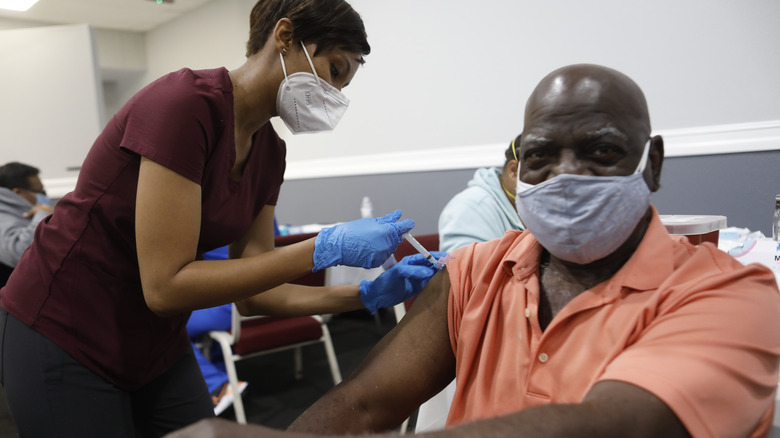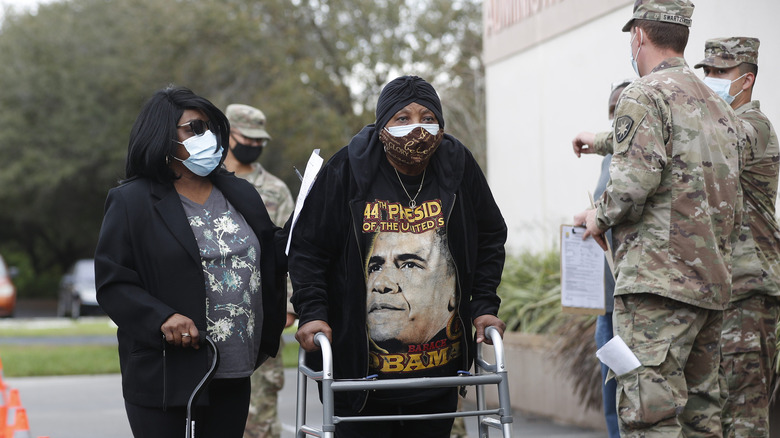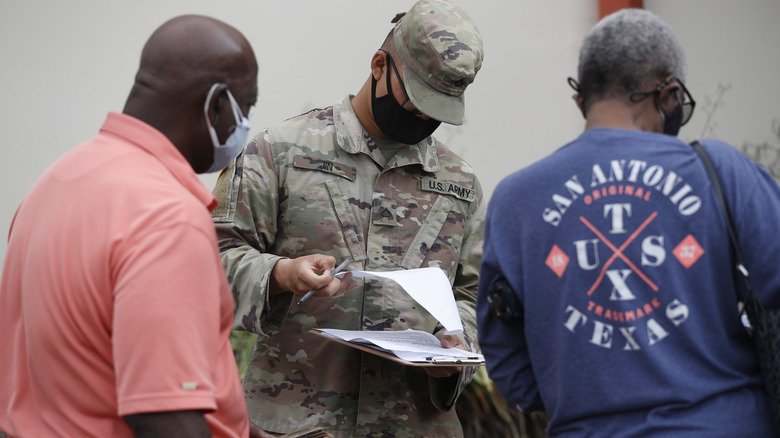LaTanja Silvester Details Why BIPOC Communities Faced Higher COVID-19 Infection Rates - Exclusive
As we enter fall, we can expect another wave of COVID-19 infections and an updated booster shot (per The Hill). These new booster shots are the first to target Omicron subvariants, which have been the predominant cause of COVID-19 infections. However, The New York Times reports that the roll-out process of the new booster can result in health disparities that particularly affect economically-marginalized communities.
One group that is actively trying to address these disparities is the New Orleans Resilience Corps. The corps targeted communities that most needed aid during the COVID-19 pandemic by sending community health workers (CHWs) door-to-door. These CHWs provided crucial health education and resources to New Orleans residents who otherwise lacked access to getting that assistance.
LaTanja Silvester, who leads the New Orleans Resilience Corps, spoke to Health Digest about the health inequities BIPOC communities in New Orleans faced during the pandemic. Silvester told us, "The pandemic and the rapidly accelerating climate crisis have shown that BIPOC communities are disproportionately vulnerable to disasters and the public health impacts that come along with them."
Building trust is key to addressing health disparities
The Louisiana Department of Health reports Black residents of Orleans Parish comprised roughly 56% of COVID-19 cases and 73% of COVID-19 related deaths, while white residents comprised nearly 30% of cases and 25% of deaths. "Communities of color have been disproportionately vulnerable to the devastating impacts of the COVID-19 pandemic," LaTanja Silvester told Health Digest. Furthermore, Silvester said in New Orleans, "the Latinx community was one of the last to receive COVID-19 vaccines."
Silvester explained some of the challenges BIPOC communities faced during the pandemic, which resulted in disparate health outcomes, such as higher COVID-19 infection rates and limited access to vaccines. The barriers between BIPOC residents and healthcare agencies presented challenges for the New Orleans Resilience Corps. "Initially I had to face the stark reality that Black and brown people's long and complicated history with both private and federal industries presented a difficult challenge," Silvester said.
She added, "With that in mind, when I was developing the program model, I made it of extreme importance to foster equity in our outreach and engagement. I knew that to build trust and confidence in the BIPOC community, we needed to hire trusted community advocates who were culturally competent individuals from the communities we were engaging." She said gaining the community's trust was the first, yet most important step in promoting the benefits of vaccines and empowering the BIPOC community through the recovery process.
The New Orleans Resilience Corps addresses racial health disparities
By collaborating with the New Orleans Health Department, community health workers (CHWs) with the New Orleans Resilience Corps were able to provide the most up-to-date information on COVID-19 to residents. "We also collaborated and implemented a questionnaire that captures the base of information provided to residents and the source of information while emphasizing residents' ability to use the information rather than just understand it," Silvester told us.
The corps' efforts paid off after spending over 1,200 hours in the field, meeting over 15,000 residents who lived in primarily lower-income neighborhoods. The CHWs held 96 COVID-19 testing/vaccination drives which gave more than 13,000 rapid testing kits out to community members. In April 2021, the corps also focused on vaccination efforts of the Latinx community and translated informational brochures on COVID-19, which helped bridge the access gap Latinx residents in New Orleans faced.
With the successes the New Orleans Resilience Corps saw through using a CHW program, Silvester hopes this is a model that can be implemented nationwide. "Our hope is that this model can be implemented in cities across the country to address the pandemic as well as other disasters, such as those related to climate change."
Learn more about the Resilience Force and The New Orleans Resilience Corps on the Resilience Force website.



